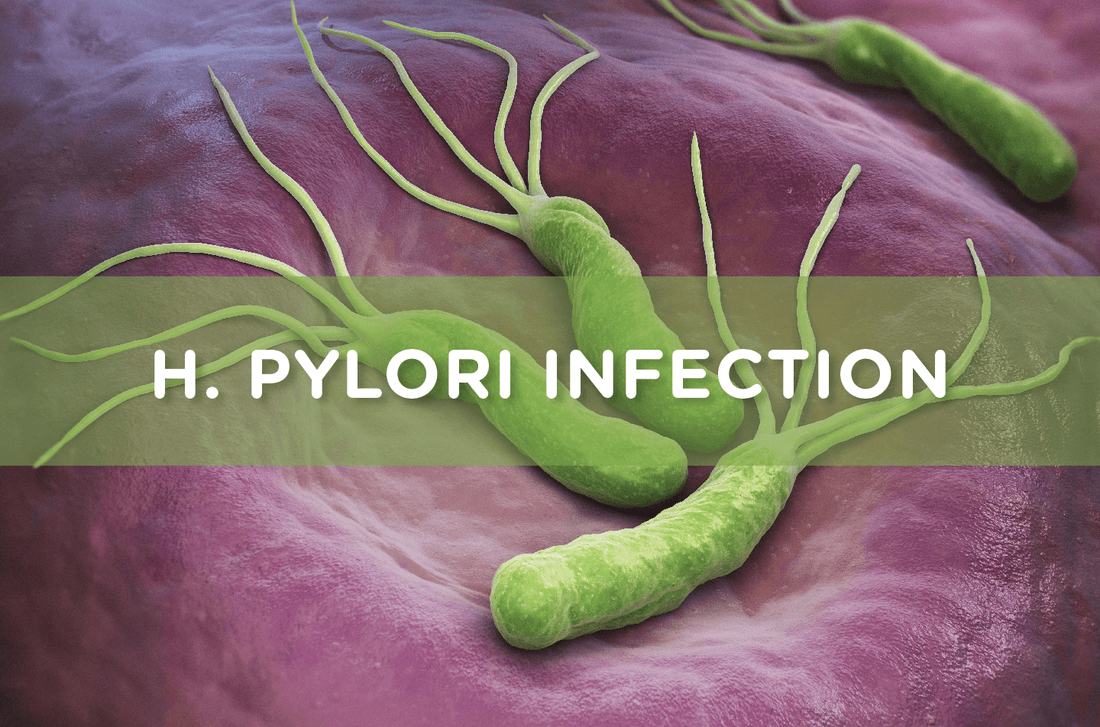Understanding Peptic Ulcers, H. Pylori and the Connection to Gut Dysbiosis
That burning feeling in your stomach? It might be more than a bit of indigestion. Ulcers of the stomach or upper small intestine, known together as peptic ulcers, can occur when the protective mucus layer of the gut is degraded. Without that protective lining, an open sore forms through to the muscular layer of the gut and can cause nausea, burning sensations and frequent indigestion.
Ulcers are commonly caused by infection with Helicobacter pylori (or H. pylori) – which roughly 60% of us carry – in addition to prolonged use of NSAID medication like aspirin or ibuprofen. A multi-factorial condition, other factors that contribute to ulcer risk include stress, alcohol use, SSRI medications and smoking.
Understanding H. pylori
Ever since the discover of Helicobacter pylori in 1982, it has been the focus of peptic ulcer research and therapy. And it’s true: traditional therapy of antibiotics and proton pump inhibitors tends to be highly effective for patients.
However, it’s important to note that not everyone who carries H. pylori will get an ulcer, in fact, only 10-20% of those who carry H. pylori do suffer1. H. pylori should also not be considered an infection; it is a normal part of the stomach microbiome for many of us. It is also thought that colonization with H. pylori actually helps defend against GERD and certain cancers1.
So, how does Helicobacter pylori end up in our stomach, and what does it do once it’s there?
First, it is well suited to live in the stomach: H. pylori is a unique microbe in that it thrives in high acidity environments; its unique structure also allows it to effectively burrow into the mucus layer of the gastric lining and firmly attach itself there. H. pylori is typically spread by human-to-human contact, although it can be spread by contaminated food and water. In fact, colonization can be as high as 90% of the population in countries with less stringent sanitation practices1. However, H. pylori is not the only microbe living in the stomach; other commensal microbes have been found in the lining of the stomach, and it is thought that these microbes help to keep the stomach environment in balance1. This is the same as in our colon; none of us have a microbiome free of potentially pathogenic microbes; instead, having a healthy microbiome balance is a strong defense against H. pylori getting out of hand.
Common Culprits
Of course, modern life offers many common culprits that may throw this microbial balance off. One culprit - unique to the stomach - is low stomach acid, which has been shown to alter the entire gut microbiome1. This can occur as we get older, if we eat a low protein diet or if we take medications to control acid production, like proton pump inhibitors for chronic reflux. This is worth noting, as proton pump inhibitors are one of the most commonly prescribed medications in North America. Long term use of PPIs may increase your risk of not only ulcers but infection with Clostridium difficile2. This is because one role that stomach acid plays is in killing off any microbes you ingest that may interfere with the balance of your intestinal microbiome; while, in the stomach, proper acidity may be critical for the rest of your non-H. pylori microbiome to thrive1.
Another notable culprit is the use of NSAID medication like ibuprofen. NSAIDs can irritate gut tissues, augment the gut barrier and ironically for an anti-inflammatory drug, increase inflammation in the gut tissues3. With chronic use of NSAID medication, a complicated feedback mechanism of bile changes, gut inflammation, damage and microbiome changes further worsen symptoms3.
Once that balance is thrown off and H. pylori begin to dominate the stomach microbiome, it produces a variety of cell toxins such as ammonia that can kill stomach cells, which triggers pro-inflammatory cytokines and an immune response that isn’t quite enough to get the infection under control…yet it’s strong enough to further damage gastric tissues. It is this cycle that can lead to gastric cancer over time, and one of the reasons why properly treating symptomatic H. pylori infection is so important. However, certain strains of H. pylori have developed antibiotic-resistance, making treatment more difficult.
Taking a Holistic Approach
Creating a pro-gut lifestyle is an important part of this defense, starting by managing stress. Stress is also a well-known and important risk factor for peptic ulcer – even in those who do not carry H. pylori4. In one study, those in the highest stress category had more than a two-fold risk of peptic ulcer than those with the lowest stress4. Stress can augment the gut microbiota and increase irritation and inflammatory damage to the gut tissue as can alcohol, and smoking. Adequate sleep is also thought to be an important tool for both prevention and healing.
And when it comes to your gut microbiome, consider probiotics. It is thought that probiotics may not only help you prevent ulcers but also provide support should you find yourself with one5. Bio-K+, with its blend of three unique Lactobacillus strains may be an excellent choice as Lactobacillus species have been shown in the literature to inhibit the growth of Helicobacter pylori5.
It’s also worth noting that proton pump inhibitors, part of the treatment for ulcers that also includes antibiotics, can have a marked effect on your gut bacteria. This type of short-term treatment is exactly what PPIs were designed for; however, many people will stay on PPIs for decades, which can increase your risk of not only dysbiosis but serious C. diff infection. Do your best to work with your doctor to minimize your PPI course; while on antibiotics, Bio-K+ is helps reduce the risk of diarrhea due to antibiotics and the risk of diarrhea due to Clostridium difficile. Take one Bio-K+, two hours after your antibiotic, every day of antibiotic treatment plus five days after.
Eating to Beat Ulcers
Should you find yourself at risk of, or diagnosed with, a peptic ulcer, know that there are plenty of nutritional steps you can take to promote a healthy gut.
Polyphenols, which are also found in turmeric, green tea, grapes and apples, appear to protect in multiple ways: protection of the gut cell and mucosal barrier, supporting gut cell repair, and decreasing both H. pylori and inflammation6. Raw honey is an antibacterial and contains polyphenols that feed good bacteria and may support healing. Foods such as broccoli, garlic and cranberry are also thought to inhibit H. pylori growth. L-glutamine, an amino acid, is another potential tool. This amino acid is associated with healing of the gut mucosal layer; it is also thought that l-glutamine may help with clearing the ammonia that H. pylori produces, reducing tissue damage7. L-glutamine is often sold as a powder, and should be taken twice a day on an empty stomach, as recommended by your health practitioner.
Peptic ulcers are not to be ignored; if you suffer from chronic indigestion, burning sensations and nausea, talk to your doctor. Take your therapy as described, while working to create a lifestyle that supports and reduces your risk of recurrence. That means sleep, stress reduction, plenty of healthy plant foods and a clinical strength probiotic like Bio-K+. Taking holistic approach, that includes lifestyle and your traditional medical treatments will help you feel your best and prevent ulcers from returning.
Do you have any other questions concerning the health of your gut microbiome? Let us know in the comments below! Join our community for more healthy tips. Click here to find a store near you. Contact us or follow us on Facebook and Instagram.
References
1. https://www.ncbi.nlm.nih.gov/pubmed/28733944 (PPI Microbiome)
2. http://biomedj.cgu.edu.tw/pdfs/2014/37/4/images/BiomedJ_2014_37_4_178_128002.pdf
3. https://link.springer.com/article/10.1007/s00535-014-1032
4. https://www.ncbi.nlm.nih.gov/pmc/articles/PMC5126869/ (Stress Ulcer)
5. https://www.ncbi.nlm.nih.gov/pmc/articles/PMC4588086/ (Probiotics ulcer)
6. https://www.ncbi.nlm.nih.gov/pmc/articles/PMC4458761/ (Polyphenols)
7. https://academic.oup.com/jn/article/139/5/912/4670373?searchresult=1 (l-glutamine)





